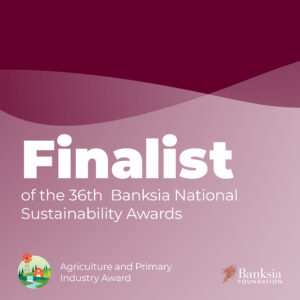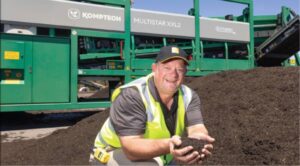Biological Farming scientist calls in to C-Wise.
Dr Maarten Stapper, former scientist at CSIRO, visited C-Wise recently to share his vast knowledge on a little understood aspect of farming – the soil. This sounds unlikely however, as he explained in his talk to the C-Wise team, our society’s embrace of modern industrial food production has changed the way we look at soil and the organisms that live in it.
The quest to feed a rapidly increasing population from arable land, which is declining by about 1% per year, is one that is exercising minds across the globe. Maarten’s belief is that we need to change our approach from chemical to biological. “The world is yet to properly appreciate the value of soil carbon” he said, it is the most important element on earth”. “Humus formation is not part of our current farming systems”. “As a result our farming soils are becoming carbon depleted and infertile”. “Modern farming has also destroyed ecosystems weakening resistance to pest and diseases”.
Maarten delivers talks to farmers, pastoralists and horticultural growers around the country encouraging methods of soil care that would not have looked strange on the land 80 to 100 years ago. His recommendations include adding soil carbon in the forms of compost and compost extracts, encouraging and valuing earthworm activity, retaining stubble rather than burning it and avoiding cultivation of the soil.
He has found that the best way forward with biological farming is to form small groups of keen farmers and get them to replace just 10 to 15% of their synthetic fertiliser budget with soil carbon inputs for the first year. He further suggests that every farm gets a regular visit from the others in their group to see and discuss how the conversion is progressing.
Tests that farmers can run on their own soils that are low in cost and easy to perform, include a Brix test, which shows the sugar levels in the crop, the higher the readings the healthier the soil and the more climate resilient the crop. Other tests are described in Soil Health Cards (www.soilcare.org/soil-healthcard.html) developed for the Northern Rivers Region in NSW. One test is to push a home made penetrometer into the soil to determine the amount of compaction that has occurred. Maarten recommends a cheap model based on a piece of fencing wireone end of which you push into the soil until you get such a pain in your palm, as the other end of the wire digs in, such that you have to stop.
It is exciting to have an eminent soil scientist tell of his passion for healthy soil, healthy food and healthy people. His talk was much enjoyed by all present.





